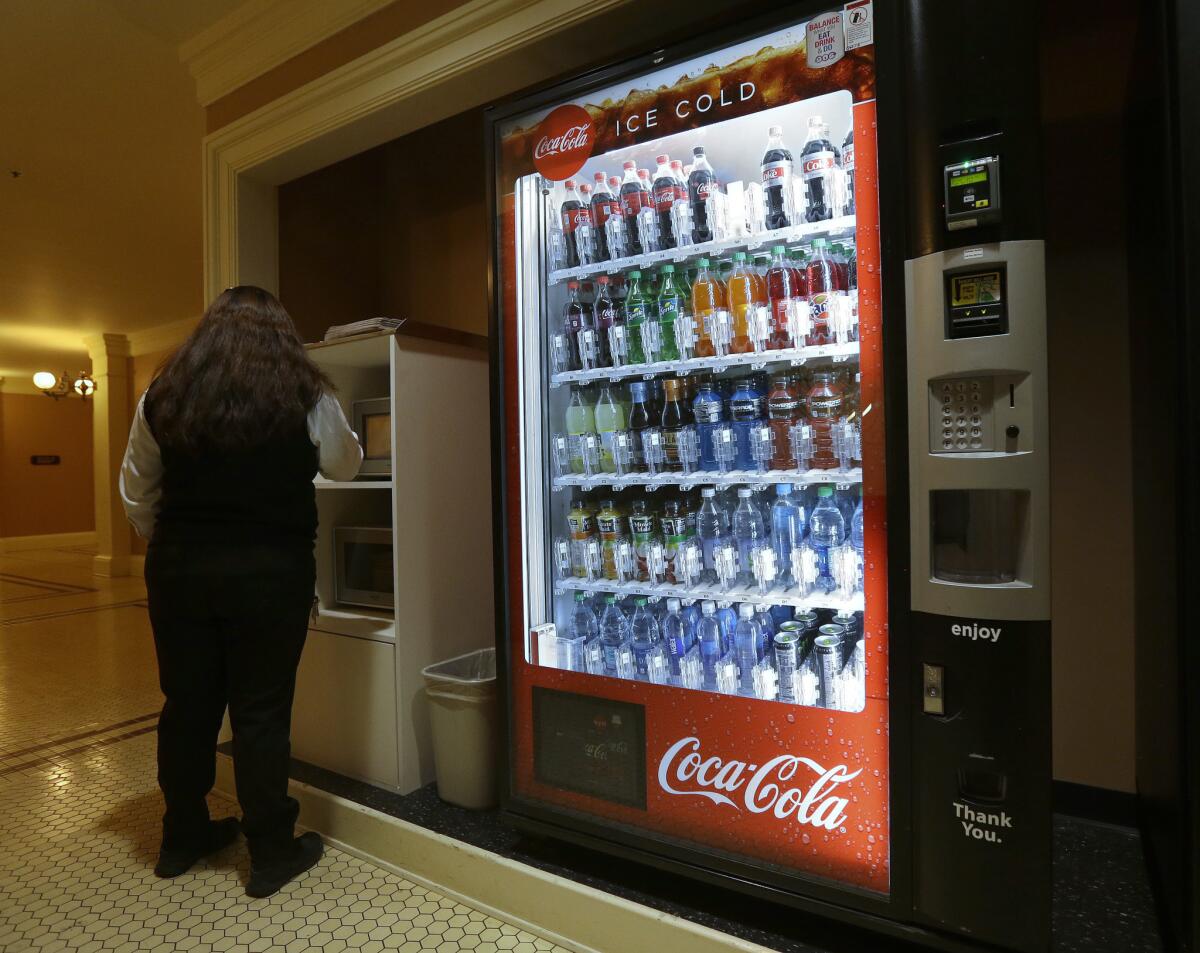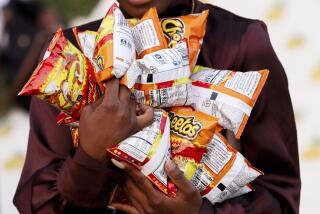Column: Warning labels for soda might be the only way to save our children from the sugar lobby

My sugar war began in January, when the third-grader arrived.
Breakfast? Scrambled eggs are OK, but she would rather have one of those processed sugar-and-cinnamon confections masquerading as cereal. Or perhaps a waffle drowned in syrup.
Lunch? How about a peanut butter and jelly sandwich, a chocolate energy bar, some trail mix she will ignore except for the M&Ms and maybe, if I am lucky, a handful of strawberries.
Dinner? Her aversion to fish is insurmountable, so we usually have chicken, turkey or steak. Thankfully, she loves broccoli. She will eat exactly one kind of salad: packaged butter lettuce, to which I am allowed to add only cucumbers, drenched with a balsamic vinaigrette so sweet it could double as dessert.
Oh yes, and speaking of dessert: When did postprandial ice cream become a basic human right?
Limiting the sugar intake of this child has become my mission, my obsession and, in truth, my constant failure.
Probably because I love sugar too.
At home, I have successfully weaned her from sweet carbonated beverages and fruit juices that offer nothing but sugar and the illusion of healthiness.
But at restaurants, pool sides and dinner parties, our soda battles rage on.
I would love to be able to tell her: You can’t have sugar because it’s against the law.
Sugar will never be against the law, of course. Nor should it.
But maybe eventually, I will have a little bit of legal ammunition on my side.
Last month, the California Senate passed a bill that would require warning labels on sugary drinks: “STATE OF CALIFORNIA SAFETY WARNING: Drinking beverages with added sugar(s) may contribute to obesity, Type 2 diabetes and tooth decay.” The bill now moves to the Assembly, which will soon hear it or table it until January.
This year, my third-grader learned about nutrition labels. She reads them obsessively. Oh, what I would give to hear her read a dire health warning on her favorite can of Sprite.
::
Naturally, Big Soda, a.k.a. the American Beverage Assn., is righteously opposed to this bill, which was proposed by Democratic state Sen. Bill Monning of Carmel.
In the last two years, according to reports, the powerful industry group has poured $11.8 million into lobbying local and state lawmakers.
“They follow the playbook of the tobacco industry in protecting their products from criticism, casting doubt on the science, lobbying, working behind the scenes, funding front groups, doing all the things that industries that make potential harmful products do,” nutrition expert Marion Nestle told Samantha Young of Kaiser Health News.
In her 2015 book “Soda Politics: Taking on Big Soda (And Winning),” Nestle argues that sodas are so implicated in tooth decay, higher calorie intake, obesity and Type 2 diabetes that the very first line of defense against these woes is to simply stop drinking these nutritionally bereft beverages.
Some cities are trying to fight the soda scourge by levying extra taxes. Big Soda did not sit still for that. A year ago, after watching voters in Berkeley, Oakland, San Francisco and Albany pass soda taxes, Big Soda poured millions of dollars into a ballot measure that would have made it nearly impossible for local voters to raise taxes.
Instead of requiring a simple majority to raise taxes, Big Soda’s bill would have required a two-thirds majority. The sole intent was to prevent voters from approving taxes on nutritionally worthless sodas. Unfortunately, it would have also raised the threshold on all new local taxes and fees — including for things like libraries and public safety.
It was an exceedingly cynical move on the part of Big Soda, which agreed to drop the measure only in exchange for the Legislature adopting a ban that will bar cities and counties from enacting soda taxes for 12 years. Soda taxes, said then-Gov. Jerry Brown as he signed the ban, “combat the dangerous and ill effects of too much sugar in the diets of children.” Bad as that is, he said, requiring two-thirds of local voters to approve new taxes is an “abomination.”
How cynical is Big Soda? It dubbed the soda tax ban the “Keep Groceries Affordable Act.”
::
If you ever look at nutrition labels, by the way, you will note that there is no recommended daily serving of added sugar. That’s because there isn’t one.
The American Heart Assn. recommends that adults consume foods with no more than six to nine teaspoons of added sugar a day. As a point of comparison, a 20-ounce Coke contains 20 teaspoons of sugar.
Last week, spinning through Amazon Prime Video, I happened upon the 2014 documentary “Fed Up,” which puts the blame for the obesity epidemic on increased sugar consumption. A collaboration between filmmaker Stephanie Soechtig and Katie Couric, “Fed Up” argues that the food industry and government, which is supposed to regulate it, are entirely responsible.
The film’s abject correlation between sugar, obesity and poor health outcomes was disputed by some nutrition experts, but there is no question that too many Americans are eating too much food that has too much added sugar, which has no nutritional value and contributes to all sorts of health problems, which are not always obvious or visible, like obesity.
Between 1971 and 2000, Americans ate less fat, but carbohydrate consumption increased and the average calorie intake rose, which led to a doubling of the obesity rate.
As one of the doctors in “Fed Up” notes, if you remove fat from food, it tastes like cardboard, unless you add a lot of extra sugar, which is what food manufacturers did.
The craze for low-fat food simply led to a greater consumption of sugar — and calories.
I was struck by something Couric said in the film: “What if every can of soda came with a warning label from the surgeon general?”
At the time, Soechtig told me, it seemed like “pie in the sky.”
It doesn’t anymore.
Twitter: @AbcarianLAT
More to Read
Start your day right
Sign up for Essential California for news, features and recommendations from the L.A. Times and beyond in your inbox six days a week.
You may occasionally receive promotional content from the Los Angeles Times.







